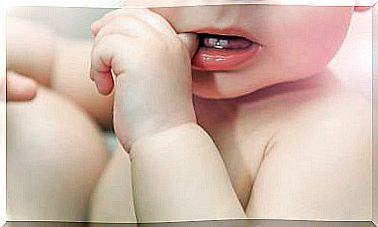How To Act If The Baby Chokes On Milk?

The first time we are mothers, everything becomes a world for us. The crying of our son alarms us and the slightest presence of fever makes us think of the worst. One of the things that we fear the most is not knowing what to do if the baby chokes on milk. We tell you the causes and solutions for this problem.
As mothers, our responsibility is infinite. We do the best we can (and we know how) and, in the case of being first time, the feelings are magnified. When any unforeseen event that could be dangerous occurs, we must act coldly and with integrity.
If we get hysterical, we will solve little. It is true that, at specific times, staying calm is practically impossible. But we have to try, for our sake and for our son’s.
Fear can neutralize any attempt to help a choking baby. You must mentalize about it and be aware that you are its protector.

What do I do if the baby chokes on milk?
Quickly, place the baby on his tummy. Tap him on the back with the palm of your hand, as this will cause him to cough. It is very common for such a young child to choke on a liquid, especially if he is not ingesting it in the correct position.
If, on the other hand, he has choked on something solid, you must perform the Heimlich Maneuver. If you still can’t fix the situation, call 911 as quickly as possible. It is very important that you have all possible help numbers in a safe place, in case anything happens.
It is far better to err on the side of caution than irresponsible. Don’t feel guilty if your baby ever chokes on milk – it can happen to any adult. How many times have we choked on a glass of water!
Why is my baby choking on milk?
If your baby chokes on milk, it can be due to multiple factors. Some have to do with us and others with her brand new body. Be that as it may, it is recommended that, if it happens often, we speak with your pediatrician. He better than anyone can advise us what to do.
When the problem is external
It may be that the flow of breast milk is too strong and, when you suck, it reaches your throat directly. This is solved by adjusting the outlet of the milk channel or expressing a little just before breastfeeding.
If the baby already drinks from the bottle, it may be that the liquid falls too fast for him. At first, many children cannot manage it properly. However, this ends up being solved with patience and with the necessary time.

When the problem is internal
Some babies may have internal problems related to swallowing or gastroesophageal reflux (the return of gastric contents into the mouth). To find out if it is due to this and not to issues related to milk or breastfeeding, it is advisable to go to a specialist.
If you want to prevent your baby from choking, try placing him in the ventral position. Try not to let him sleep in a horizontal position after taking it, but rather in a vertical position. Thus, if you suffer from reflux and choke, you may cough or vomit and there is no risk of drowning.
In the same way, don’t even think about letting him feed himself with the bottle. You must wait until he is a little older and be sure that the same thing will not happen to him again. Try to keep the crib in your room for at least the first 6 or 7 months. So you can control it much better.
Choking at this stage is quite common. You can talk to any woman who has ever been a mother. It is a more normal situation than you think! Babies are very vulnerable beings, and they need certain help to learn to move in the world.
You shouldn’t feel burdened by this stage. In a very short time your child will be able to eat and drink by himself and you will stop being afraid of something bad happening to him. Until then, try to be vigilant and follow these recommendations so as not to get more than one unnecessary scare!










